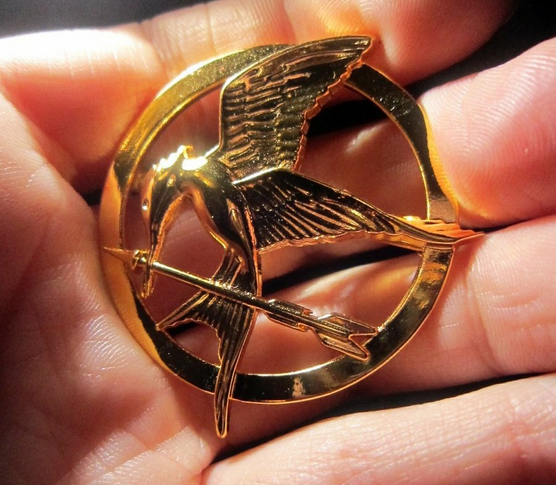NO SPOILERS AHEAD
Twenty-three children must die. This is all I knew about the “Hunger Games” before walking into the dark theater to watch the very popular film with my little sisters. If you know me at all then you might be shocked to hear that I would endorse such a movie being not only a pacifist but also a future social worker (The “Hunger Games” would be a child protective service nightmare). Throughout the movie I was shocked to find myself enthralled and at the end of my seat begging for the movie to never end. I left the theater and demanded an immediate trip to Target so I could purchase all three of the books because I needed to know how it all ended. As I plowed through book one in a couple of sittings I was amazed at what Suzanne Collins was doing with the story. You see, this story isn’t just another form of violent entertainment, and this story isn’t merely about kids killing kids, this story is something way bigger.
Much of world knows about Invisible Children’s famous KONY 2012 video and all the circumstances surrounding it. Many criticized the movement and when the director and co-founder, Jason Russell, was found having an episode of psychosis, people massacred him with their words. What’s so fascinating by all the criticism is that no one ever really stopped to write an article about the fact that people were actually dying. Kids were killing kids. Instead of caring about kids killing kids, all Americans wanted to do was make the whole situation into some kind of weird spectacle shoving the story through media outlets and every avenue of criticism. Along the lines of weird spectacles, another thing Americans love to do is watch reality television. Isn’t it wonderful to watch “Real Housewives of wherever” as women go through divorces and spend their days trying to look prettier than naturally possible. We love to watch people in pain, and then we love even more to criticize them. What about these recent stories of Apple’s use of labor in China? Apple is becoming one the richest and most powerful companies in the world as they feed into the American needs of their iPad’s and iPod’s. The Chinese are working in factories for twelve hours a day, six days a week, earning about $132 per week making products for our grubby little rich hands.[1] Americans are the epitome of consumers, and we don’t care that our lifestyle causes suffering for many around the world.
In the Hunger Games, Collins makes it so obvious that the privileged minority is the Capitol (most Americans) and the Districts are everyone else who suffers so we can be satisfied. Collins makes this clear by naming the featured country “Panem” which is a twist off of the Latin word, “Panem et circenses”, which means, “Bread and Circuses”. This stems from the ancient practice of politicians making their citizens happy and distracted not with their exemplary public service, but with food and entertainment. Sound familiar?
I admit that I am no better than who I am accusing here. I am desensitized to war, I watch reality television, and I am typing these words on a MacBook (I am distracted by bread and circuses!). But this is why instead of feeling weird or angry about Collins storyline in the “Hunger Games”, I felt like she had literally come through the movie screen and slapped me in my face. Because Americans (me included) put their needs of gadgets, food, entertainment, and wealth above so many things. We so often distract ourselves from the realities of this world to keep ourselves comfortable with how we are living our lives. Are we guilty of getting so caught up in bread and circuses that we have completely lost focus on the negative effects from our consumerism?
If you walk away from “Hunger Games” thinking that that could never happen in our lifetime, that we would never stand for such behavior, think again. A reality television show that keeps us entertained, powerful, and is made up with the suffering of others? Not so far off our current radar. Because we already live in world where we will accept anything the media or politicians throw at us, and we are happy to embrace almost any kind of entertainment. We love our bread and circuses.
[1] http://www.nytimes.com/2012/01/26/business/ieconomy-apples-ipad-and-the-human-costs-for-workers-in-china.html?pagewanted=all






 etc. etc. I hesitate in listing all of these things because I am still weak in so many areas (i.e. how can I give up my mac????!!!!). While I have my convictions in this area and I am not afraid to express them, I also know that I am living a more extreme lifestyle than many in these areas we list. And so I do try to encourage others to be challenged, convicted, and changed by these areas that I am Challenged, Convicted, and HAVE Changed or am TRYING to change in. In regards to people thinking they cannot make a change single handedly, I disagree. We have so many amazing examples of people who have made a difference in this world by standing in what they believe in through simple acts (I think of Rosa Parks). Bringing up the Apple computer issue again, I have thought about this horrible issue of the slave market a lot. Locally, I am trying to battle sex slave trafficking often. On a worldwide level, it is such a difficult issue because while I know these people are working in inhumane conditions, I also know that they need to feed their families. PLEASE understand that I do not condone what Apple (and many other big businesses) are doing, but the answer might not be so much in boycott’s, but in journalism and policy making. Our generation is living in an exciting time to make decent changes for people through the avenue of television and the internet (i.e. Invisible Children). I have heard reports that ever since that Apple story broke, they have really shaped up their factories in China. Again, please do not take this statement the wrong way… I study social welfare at UC Berkeley so I am obviously pro-justice in every area.
etc. etc. I hesitate in listing all of these things because I am still weak in so many areas (i.e. how can I give up my mac????!!!!). While I have my convictions in this area and I am not afraid to express them, I also know that I am living a more extreme lifestyle than many in these areas we list. And so I do try to encourage others to be challenged, convicted, and changed by these areas that I am Challenged, Convicted, and HAVE Changed or am TRYING to change in. In regards to people thinking they cannot make a change single handedly, I disagree. We have so many amazing examples of people who have made a difference in this world by standing in what they believe in through simple acts (I think of Rosa Parks). Bringing up the Apple computer issue again, I have thought about this horrible issue of the slave market a lot. Locally, I am trying to battle sex slave trafficking often. On a worldwide level, it is such a difficult issue because while I know these people are working in inhumane conditions, I also know that they need to feed their families. PLEASE understand that I do not condone what Apple (and many other big businesses) are doing, but the answer might not be so much in boycott’s, but in journalism and policy making. Our generation is living in an exciting time to make decent changes for people through the avenue of television and the internet (i.e. Invisible Children). I have heard reports that ever since that Apple story broke, they have really shaped up their factories in China. Again, please do not take this statement the wrong way… I study social welfare at UC Berkeley so I am obviously pro-justice in every area.
8 Comments
Leave your reply.